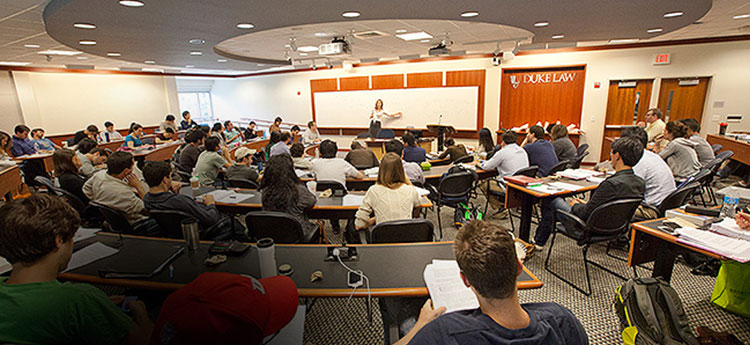
Master of Arts in Applied Ethics & Policy, JD/MA Program
About the Duke JD/MA program.
AI, big data, social media, genomics, and neuroscience have created legal, ethical, and societal challenges which demand an interdisciplinary approach and visionary leadership. Students in the JD/ Master’s in Applied Ethics & Policy program focus on these intersectional problems and prepare themselves to drive legal and policy solutions for decades to come. The JD/MA program enables students to obtain both a JD through Duke Law School and an MA in Applied Ethics & Policy in three years and one summer. Under the umbrella of the MA in Applied Ethics & Policy, Science & Society offers two specialized curriculum opportunities: Bioethics & Science Policy and Tech Ethics & Policy.

Students apply to the joint degree program during the first semester of their 1L year. Current application deadline is October 1. (Applications may no longer be submitted along with the Law School application. Summer start is no longer available.) The curriculum requirements for the MA are undertaken along with the JD requirements and students will most commonly graduate with both degrees in the spring of their third year.
During the summer after their 1L year, students undertake their capstone projects. Past students have done their capstones in general counsels’ offices, law firms, university legal offices, research institutes, corporations, and non-profits.
I’ve loved the program so far. I truly think that the program has really helped me with everything in my career so far. Every interview, every courtship interview, or job interview, it comes up. It’s a really great conversation starter. And it helps set you apart with everything. I’ve really had some amazing opportunities that I definitely would not have been able to absent this dual degree. I was able to do a really cool independent study with one of my professors, Casey Mock. I got to lobby in South Carolina. It was just so much fun and such a unique experience that, absent this dual degree program, I would not have been able to do.

– Natalie Leon, JD/MA ’25
Curriculum Requirements
A JD/MA student in Applied Ethics & Policy must complete 75 JD credits and 30 MA credits to receive both degrees. Dean Lacoff will meet with you after your enrollment to discuss how to integrate your JD requirements with your MA requirements and has created a spreadsheet for each of you to use in tracking your progress toward completing both degrees. Please remember that if you do not complete your MA, you cannot receive your JD.
MA Core Courses (Complete a Total of 15 Credits):
- BIOETHIC 602: Law Research & Bioethics (3 credits) (offered in fall)
- BIOETHIC 603: Clinical Bioethics & Policy (3 credits) (offered in spring)
OR SCISOC 585: Digital Intelligence (3 credits) (offered in spring)- Note:Students intending to claim the Biosciences, Bioethics & Science Policy concentration should take BIOETHIC 603. Students intending to claim the Tech Ethics & Policy concentration should take SCISOC 585.
- BIOETHIC 591-01 Topics in Science Policy: Scholarly Writing) (2 credits in 3L Fall; 1 credit in 3L spring) [BIOETHIC 606: Communicating Science Policy (3 credits) (offered in spring) is an elective for JD/MA students.]
- BIOETHIC 704: Science Law & Policy (3 credits) (offered in fall) [This course is cross-listed with the Law School; please be sure to register under the Graduate School/BIOETHIC 704 number, not LAW 333]
- You have two choices for your final required core course.
- SCISOC 690: Special Topics in Science & Ethics: Applied Ethics & Policy (offered in the fall)
- OR You may take one of Prof. Jolynn Dellinger’s courses on privacy:
- SCISOC 615: Privacy: Concepts and Culture Informing Law and Policy (3 credits) in the spring of your 1L year.
- SCISOC 614: Privacy, Ethics, Data and Technology (3 credits) (offered in fall)
- LAW 331: Introduction to Privacy Law and Policy (3 credits) (offered in spring).
- SCISOC 615 is a seminar designed for the JD/MA students and we recommend that you take this course following admission to the program, although if your schedule requires, you may take one of the other privacy courses. If you take LAW 331, please notify Dean Lacoff prior to Add/Drop to reclassify this course for Graduate School credit.
We encourage you to take at least one of the 3 credit core requirements in your 2L fall semester.
Capstone Course (9 Credits):
In addition, you will complete a capstone project totaling 9 credits which will be taken the summer following your 1L year.
- BIOETHIC 705: Capstone – Bioethics and Science Policy – 9 total credits (graded)
Register for 4.5 credits for both Summer 1 and Summer 2 following your 1L year. Your summer job constitutes your practicum.
You will present the work you conducted for your Capstone with an MA Final during the second semester of your 3L year, when you are preparing to graduate.
Elective Credits (12 credits, with 6 of those credits counting toward the MA Degree:
You will also take a minimum of 12 credits from a designated list of Law School courses, selected by Science & Society in coordination with the Law School. These are listed on the Science & Society website. If there are other Law School courses which you believe should be included on this list, please contact us.
With the approval of the Director of Graduate Studies, 3 of these elective credits may be taken in another school within the university.
These elective credits may count either toward the MA or JD credit requirements (but not both) and at least 6 credits MUST be counted toward the MA degree. JD/MA students register for these courses using their law school priority status and must designate them as MA electives no later than the end of add/drop by contacting Dean Lacoff.
Research Credits (6 credits)
You must register for 6 research credits under Research 1-01. These research credits are a bookkeeping requirement of the Graduate School, do not require you to perform any additional work and do not count towards an overload. We recommend that you register for 3 of these credits during 2L fall and 3L fall.
Responsible Conduct of Research (RCR)
In order to satisfy the requirements set by the Duke Graduate School, JD/MA students must register for the following RCR forums:
- The Law Research and Bioethics (BIOETHIC 602) counts as one of your RCR requirements.
- TGS714
- TGS715
GS714 and GS715 are given during fall MA orientation and we strongly recommend that you attend these programs. If, however, you are unable to attend due to law school conflicts, you may make up for these two RCR credits by taking two RCR forums offered by the Graduate School at any point before graduation. https://gradschool.duke.edu/professional-development/programs/responsibleconduct-research/rcr-forums/
MA Final (Required, but No Graded Credits)
The Graduate School requires each student receiving a Master’s Degree to sit for an MA Final during the semester prior to graduation. The requirements for the MA Final will be described in a separate memo.
You will have separate GPAs for your JD and MA curricula. Your Law School classes will be graded on the established Law School numeric curve. You will receive alphabetic grades for your MA classes and a separate GPA calculated from these grades.
All JD/MA students should consult with their academic advisors at the Law School to assure that their coursework complies with all of the Law School requirements to obtain a JD, as part of a joint degree.

How to apply to the JD/MA program:
- Apply by 10/1/2026
- Contact Duke Law School Admissions and request that your law school application be forwarded to the Graduate School.
- Complete the application for the MA in Applied Ethics & Policy through the graduate school, including the application form, the essays, and supplemental questions. *(You will need to search for our old program name “Bioethics & Science Policy” until the Grad School Portal updates with our new program name.)
- You will need to obtain three references (the law school does not retain copies of reference letters and the ones you submitted for the law school application will not be included in the materials forwarded to us).
- Transcripts will be included in the law school dossier.
- The Graduate School will waive the GRE requirement and accept LSAT scores.

